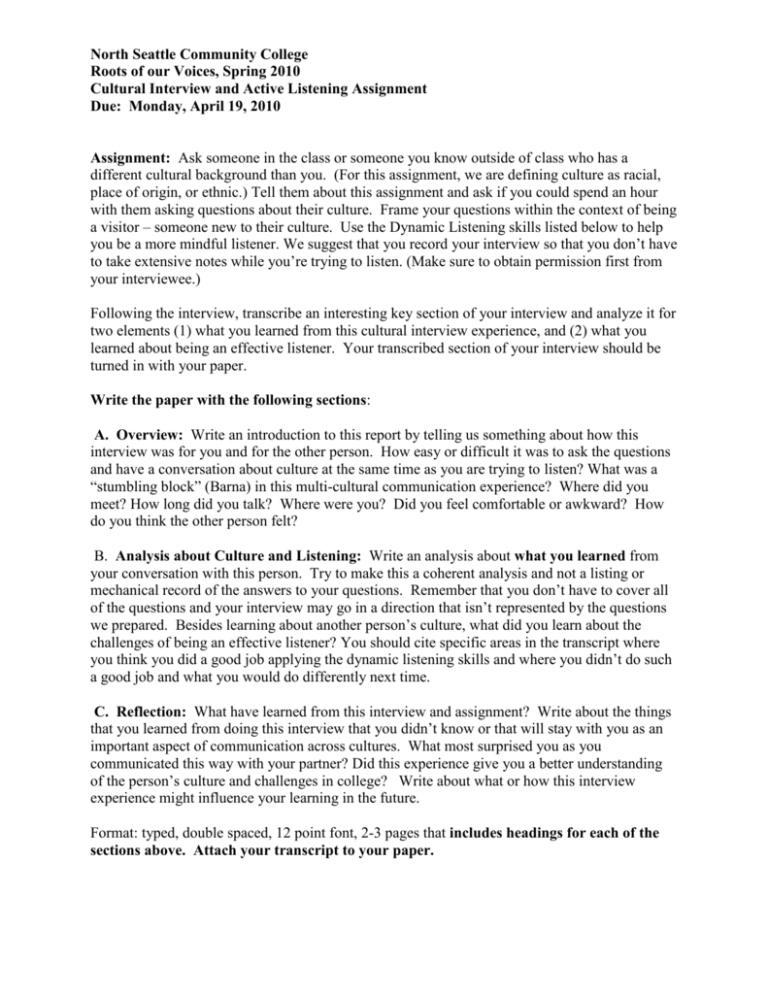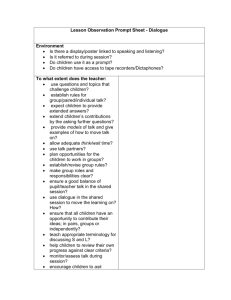Cultural Interview Assignment: Active Listening & Culture
advertisement

North Seattle Community College Roots of our Voices, Spring 2010 Cultural Interview and Active Listening Assignment Due: Monday, April 19, 2010 Assignment: Ask someone in the class or someone you know outside of class who has a different cultural background than you. (For this assignment, we are defining culture as racial, place of origin, or ethnic.) Tell them about this assignment and ask if you could spend an hour with them asking questions about their culture. Frame your questions within the context of being a visitor – someone new to their culture. Use the Dynamic Listening skills listed below to help you be a more mindful listener. We suggest that you record your interview so that you don’t have to take extensive notes while you’re trying to listen. (Make sure to obtain permission first from your interviewee.) Following the interview, transcribe an interesting key section of your interview and analyze it for two elements (1) what you learned from this cultural interview experience, and (2) what you learned about being an effective listener. Your transcribed section of your interview should be turned in with your paper. Write the paper with the following sections: A. Overview: Write an introduction to this report by telling us something about how this interview was for you and for the other person. How easy or difficult it was to ask the questions and have a conversation about culture at the same time as you are trying to listen? What was a “stumbling block” (Barna) in this multi-cultural communication experience? Where did you meet? How long did you talk? Where were you? Did you feel comfortable or awkward? How do you think the other person felt? B. Analysis about Culture and Listening: Write an analysis about what you learned from your conversation with this person. Try to make this a coherent analysis and not a listing or mechanical record of the answers to your questions. Remember that you don’t have to cover all of the questions and your interview may go in a direction that isn’t represented by the questions we prepared. Besides learning about another person’s culture, what did you learn about the challenges of being an effective listener? You should cite specific areas in the transcript where you think you did a good job applying the dynamic listening skills and where you didn’t do such a good job and what you would do differently next time. C. Reflection: What have learned from this interview and assignment? Write about the things that you learned from doing this interview that you didn’t know or that will stay with you as an important aspect of communication across cultures. What most surprised you as you communicated this way with your partner? Did this experience give you a better understanding of the person’s culture and challenges in college? Write about what or how this interview experience might influence your learning in the future. Format: typed, double spaced, 12 point font, 2-3 pages that includes headings for each of the sections above. Attach your transcript to your paper. Some questions to explore with your cultural partner: 1. What should I know of your culture’s recent history, governance and language? 2. What do you understand as the major values and beliefs of your culture? 3. What cultural customs might surprise me? 4. If I were to fall in love with someone from your culture, what would you advise me in terms of dating, courtship and marriage practices? 5. What do different cultural practices look like? For example, understanding of work and leisure? 6. Do you have a religious tradition? How was it shaped by your culture and historical tradition? How has this tradition shaped your understanding of the world? 7. What do you see as the most important thing we can do to build greater understanding between cultures? Dynamic (Active) Listening and the Cultivation of Empathy (seeking to understand) 1. Presencing– Intentionality (I choose to be here); breathing (centered in the present moment). Listening Tip: Empty your mind of thoughts, ideas, plans, and concerns so that you are open to the other person. 2. Receiving – Opening heart and mind to hear/receive the “whole” message. Listening Tip: Concentrate on the person with whom you are interacting. Say to your self, "I want to focus on this person and what he or she is feeling and thinking." 3. Clarifying – Asking strategic questions to open up greater understanding. Listening Tip: If you find yourself framing responses to the other person, try to push those aside; they interfere with your concentration on what the other person is saying. If your mind wanders, don't criticize yourself; that's distracting. Instead, gently refocus on the person you are with and what that person is communicating to you. It's natural for other thoughts to intrude, so just push them away and stay focused on the other person. 4. Summarizing/Paraphrasing – Restating to seek clarification of understanding. Listening Tip: Let the other person know you are attending mindfully by giving nonverbal responses (nods, facial expressions); ask questions to encourage elaboration; keep eye contact (as appropriate). 5. Observing Nonverbals Listening Tip: Listen for feelings; be aware of the “hidden” content in the message; listen to the sounds of the words (tone, rate, volume). Watch for hot/cold nonverbals. 6. Resonating - moving beyond me to you; moving beyond you/me to we. Listening Tip: In this part of communicating/listening experience, you find yourself in a heightened state of respect, understanding, even excitement as you seek to fully understand another person through the act of listening. 7. Checking – Did I fully understand what you shared with me? If not, ask for clarification. 8. Personal Reflecting – What did I do well and what could I have done differently to be a more effective listener? Evaluate how mindfully you listened. Did you understand the other person's thoughts and feelings? Did you feel more focused on that person than you usually do when listening to others?




